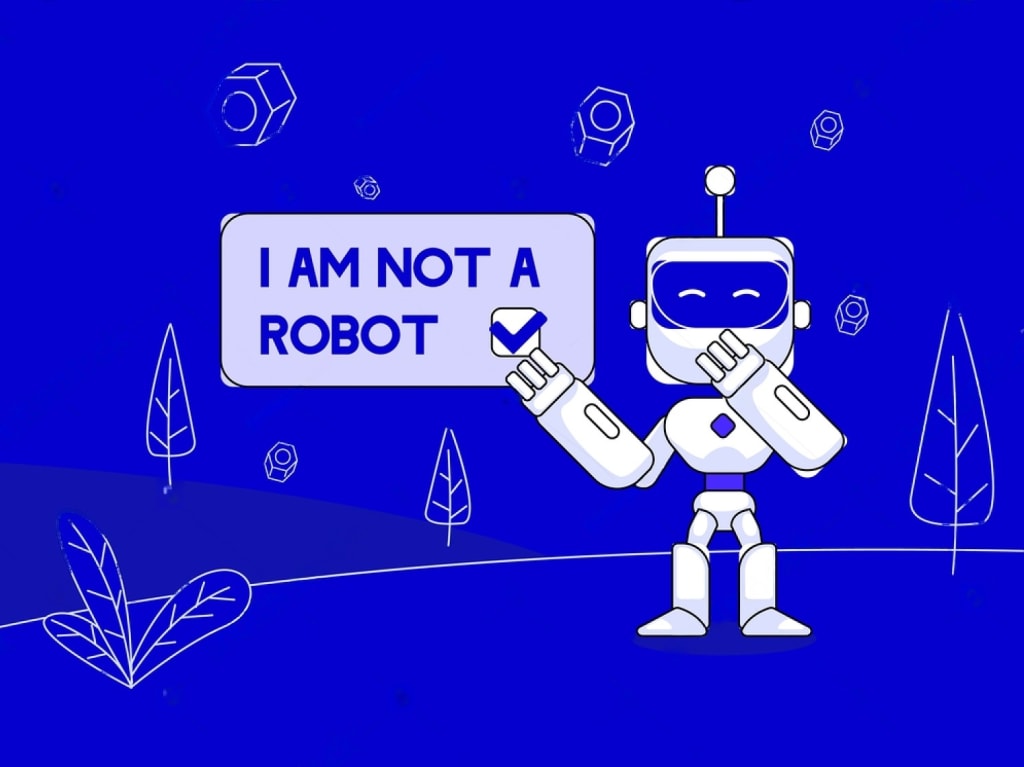Content warning
This story may contain sensitive material or discuss topics that some readers may find distressing. Reader discretion is advised. The views and opinions expressed in this story are those of the author and do not necessarily reflect the official policy or position of Vocal.
CAPTCHAs are obsolete: AIs are better at impersonating humans than we are
Artificial intelligence has made staggering progress in recent years, particularly in terms of CAPTCHA resolution. These annoying little tests are now completely obsolete, according to the results of a team of American researchers.

OpenAI, Microsoft and Google have sworn to Joe Biden to make artificial intelligence safer. Meanwhile, AI advances are chilling. According to a study by a team of researchers at the University of California, robots are particularly good at solving CAPTCHA, these unbearable little puzzles designed to verify that a user is indeed a human being.
From its full name Completely Automated Public Turing test to tell Computers and Humans Apart (CAPTCHA), this technology older than the internet will be well put back in the closet of history after the discovery of American researchers. Indeed, AI pretend to be humans better than us: robots are much better and faster to solve these tests.
CAPTCHA overwhelmed by artificial intelligence
The information is to be taken with a grain of salt, since the published article has not yet been peer reviewed. However, the researchers come from a renowned academic institution. They found that despite the improvement of CAPTCHAs over the past two decades, techniques to circumvent them have overtaken them, notably through artificial intelligence.
The researchers examined 120 of the 200 most popular websites, which use CAPTCHA to verify that users are human beings. They then asked 1,400 participants of different levels of computer literacy to complete a total of 14,000 of these CAPTCHAs. They then compared their results to those of AI designed to thwart these tests.
As a result, the robots were able to beat the human participants, not only in terms of speed, but also in terms of accuracy: that of humans ranged from 50 to 84%, while the robots had an impressive accuracy rate of 99.8%.
Artificial intelligence, a danger on a large scale
In the pages of New Scientist, team leader Gene Tsudik says, “CAPTCHA is very unloved. We didn’t have to do a study to come to that conclusion,” he says humorously. “But people don’t know if this effort, this colossal global effort that is invested in CAPTCHA resolution every day, every year, every month, is really worth it.” If the results of the study are true, it is a considerable waste of time for all of humanity.
More seriously, scientists warn in their paper that “if nothing is done, robots could perform harmful actions on a large scale”. A warning that echoes the concerns of Sam Altman, the creator of ChatGPT, who is so afraid of its creation that he makes insomnia.
Navigating the Perils of Unchecked Advancement: Harnessing AI's Potential Responsibly
The narrative surrounding CAPTCHAs has shifted from a security checkpoint to a poignant illustration of the expanding prowess of artificial intelligence. Gene Tsudik's candid remark about CAPTCHAs being "very unloved" reflects a collective sentiment regarding these puzzles. Yet, the implications extend far beyond mere annoyance. The realization that the monumental effort invested in maintaining CAPTCHAs might be in vain is a wake-up call to the dynamic nature of technological progress.
The cautionary words of scientists serve as a beacon, foretelling the potential repercussions of unchecked AI advancements. The specter of robots conducting harmful actions on a grand scale looms, punctuating the need for immediate attention. This clarion call resonates eerily with Sam Altman's sleepless nights—a reminder that innovation must be met with vigilant introspection.
The evolution from CAPTCHAs to AI's broader capabilities marks a paradigm shift. It signifies a transformation wherein machines not only surpass human abilities but also blur the lines between genuine human interaction and simulated engagement. As AI becomes more adept at understanding context, tone, and nuance, concerns arise regarding the authenticity of online interactions.
The study's revelations must prompt collective action. While commitments to AI safety are commendable, they must be matched with proactive efforts to address the potential dark underbelly of AI. This involves developing mechanisms to identify AI-generated content, robust safeguards to prevent algorithmic manipulation, and ethical guidelines for AI developers to adhere to.
In this landscape, the role of governments, industries, and society at large becomes crucial. Collaboration is key, spanning from fostering AI education to enacting comprehensive regulations that govern AI's deployment. As AI's reach extends to critical sectors like healthcare, finance, and transportation, its impact on people's lives necessitates an unwavering commitment to safety.
In conclusion, the metamorphosis of CAPTCHAs serves as a microcosm of AI's trajectory—one that's replete with both promise and peril. As Gene Tsudik humorously points out, the disdain for CAPTCHAs is evident, but their significance in the broader discourse of AI security is undeniable. The admonitions of scientists and the insomnia-induced reflections of Sam Altman form a mosaic of concern that demands our attention. Only by recognizing AI's duality—its power to empower and endanger—can we shape a future where innovation flourishes without compromising the safety and dignity of humanity.
About the Creator
Kh Med
A blogger specializing in publishing the latest technology news, innovations and developments in the technology world, and a website owner: https://azeertyy.blogspot.com/
You can also visit us at medium
Enjoyed the story? Support the Creator.
Subscribe for free to receive all their stories in your feed. You could also pledge your support or give them a one-off tip, letting them know you appreciate their work.






Comments
There are no comments for this story
Be the first to respond and start the conversation.